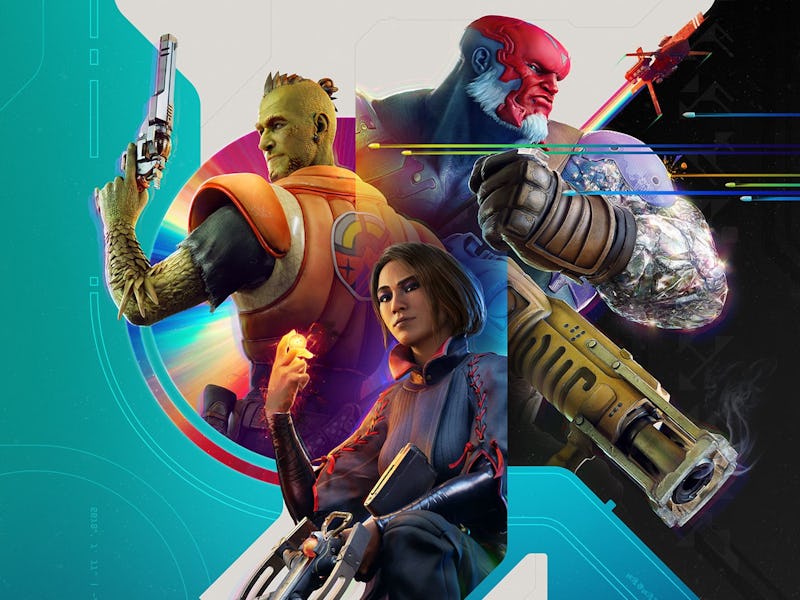Concord Dev Firewalk Studios Is Being Closed, and Sony Blames Everyone But Itself
We’re all trying to find the guy who did this.

When the ill-fated PlayStation 5 exclusive Concord was pulled offline earlier this year, it wasn’t clear yet whether Sony would spend time to rework the game or simply shut it down for good. Now we have the answer, and it’s the worst case scenario for the game’s players and developers alike. Sony is abandoning Concord, dissolving the studio that made it, and closing an unrelated mobile game studio while it’s at it.
Sony announced that it’s closing Firewalk Studios in an October 29 press release from PlayStation CEO Hermen Hulst. “After much thought, we have determined the best path forward is to permanently sunset the game and close the studio,” he said. ”I want to thank all of Firewalk for their craftsmanship, creative spirit and dedication.”
Sony did not immediately respond to Inverse’s request for comment.
Concord got a rocky reception from players from its first reveal.
Hulst also takes the opportunity to announce the closure of mobile game studio Neon Koi and the cancellation of an unnamed action game it was making, because why not pile on the misery when you have the chance? Both Firewalk and Neon Koi were acquired by Sony less than two years ago.
As far as heartless press releases announcing massive layoffs go, Hulst keeps his short and to the point. Few words are spent even acknowledging the human beings whose lives are about to be upended by Sony’s decision, and there’s not so much as a hint of remorse over sacrificing them in pursuit of the company’s profits.
“I want to express my gratitude to everyone at Neon Koi for their hard work and endless passion to innovate,” Hulst says at one point. And to the former workers of Firewalk, “I want to thank all of Firewalk for their craftsmanship, creative spirit, and dedication.”
“I know none of this is easy to hear, particularly with colleagues and friends departing SIE,” he writes later. “Both decisions were given serious thought, and ultimately, we feel they are the right ones to strengthen the organization. Neon Koi and Firewalk were home to many talented individuals, and we will work to find placement for some of those impacted within our global community of studios where possible.”
Concord developer Firewalk Studios is closing along with mobile developer Neon Koi.
The release’s casual disregard for the people Sony is laying off — Bloomberg reports they number around 200 — at least feels more honest than the hand-wringing often found in similar dispatches, but that doesn’t make it better. The people Sony has just left unemployed are “talented,” they do “hard work,” and show “passion” and “dedication.” They were, in other words, useful to Sony, but not quite so much that the company doesn’t view their dismissal as necessary to “strengthen the organization.”
Firewalk’s own statement goes into far more depth to give its developers credit for what they managed to accomplish in the production of Concord. It argues that even if the final game didn’t land, its design is still something to be proud of.
“We took some risks along the way – marrying aspects of card battlers and fighting games with first-person-shooters – and although some of these and other aspects of the IP didn’t land as we hoped, the idea of putting new things into the world is critical to pushing the medium forward,” Firewalk said.
I’m not here to tell you Concord is some secret masterpiece we all should have loved — it isn’t — but the people who poured years into its development deserve better than Sony’s faint praise in the midst of their layoff.
Sony’s reasons for closing the two studio’s aren’t made clear by the release, either. Concord fell short of “meeting player expectations,” and Neon Koi’s unnamed title was evidently not “in line with PlayStation Studios’ pedigree.”
Despite failing with Concord, Sony is evidently pushing forward with more live service games.
What’s definitely not to blame, though, is Sony itself. There’s been plenty of theorizing about exactly why Concord failed to land, but players’ exhaustion with live service games, poor marketing, and a failure to respond to criticisms that arose in the game’s pre-launch beta all seem to have had some impact. It’s not clear that Concord would have fared better had Sony not acquired Firewalk, but that doesn’t change the fact that the game’s publisher failed to address those issues when it had the chance. Sony doesn’t explicitly lay the blame for the closure of Neon Koi and Firewalk on the developers, but it’s notable that every reason given implicates the quality of their games, rather than Sony’s strategy.
To Sony, Concord’s inability to connect with players isn’t a wake-up call, but rather a learning opportunity.
“The PvP first person shooter genre is a competitive space that’s continuously evolving, and unfortunately, we did not hit our targets with this title,” Hulst said. “We will take the lessons learned from Concord and continue to advance our live service capabilities to deliver future growth in this area.”
It’s hard to imagine that’s a comfort to anyone. Sony bet big on Concord, but seemingly did nothing to respond either to player fatigue with its model of live service shooter or addressed direct criticisms when it had the chance. It was apparently easier and cheaper to simply cut loose the people who had been working on it well before Sony purchased Firewalk and hope the next attempt goes better. For the sake of whatever studio catches Sony’s eye next, I sincerely hope it does.